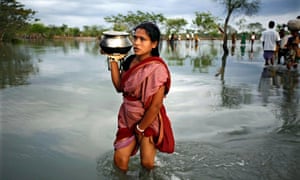Patricia Scotland: Women shouldering the burden of climate crisis need action, not speeches
Milikini Failautusi,
30, lives on the Pacific island of Tuvalu. She has become virtually a nomad in
her own country after rising tides forced her to leave her ancestral atoll and
move to the main island, Funafuti. She is now a climate
activist. She can no longer visit her home island, yet remains committed to her
country with a burning desire to prevent her own children from inheriting an
underwater ghost town. This is not just Milikini’s story.

A woman wades through flood waters in the aftermath of Cyclone Aila in Bangladesh
in 2009. Photograph: Abir Abdullah/EPA

A woman wades through flood waters in the aftermath of Cyclone Aila in Bangladesh
in 2009. Photograph: Abir Abdullah/EPA
While climate change
threatens livelihoods and security around the world, it is women who are
bearing the brunt. Women predominate in the workforces of many sectors that are
most vulnerable to climate change such as agriculture, livestock and fishing. To make things worse,
inequalities mean women are more likely to suffer dislocation to their lives as
a result of flooding and drought. According to the UN, about 80% of people
displaced by climate change are women. More than 70% of those displaced by
the 2010 flooding in Pakistan were women and children. Among those who lost
their lives in India, Indonesia and Sri Lanka as a result of the 2004 Indian Ocean tsunami, three
times more women died than men.
But why? Rigid gender roles in
the region meant men in the region were more likely to be able to swim than
women. Furthermore, women were more likely to be caring for children and family
members during the critical evacuation time....
https://www.theguardian.com/global-development/2020/mar/13/women-shouldering-the-burden-of-climate-crisis-need-action-not-speeches
